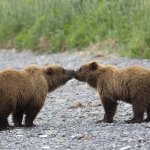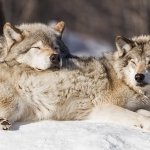Safety Guide to Cougars
We are fortunate to share British Columbia with cougars, one of the most mysterious and elusive of all wild animals. The cougar’s secretive habits and astounding predatory abilities – a cougar is capable of killing a 270 kg (600 lb) moose – have resulted in a wealth of misconceptions and irrational fears. Actually, most BC residents live all their lives without a glimpse of a cougar (mountain lion), much less a confrontation with one.
Conflict between cougars and humans is extremely rare. In the past 100 years, a total of five people have been killed by cougar attacks in B.C. (in comparison, bees kill upwards of three Canadians every year). All but one of these fatal cougar attacks occurred on Vancouver Island. During the same period, there were 29 non-fatal attacks in BC – 20 of which occurred on Vancouver Island. The vast majority of these attacks were on children under the age of 16.
Cougars primarily occupy the southern third of the province of British Columbia. Most conflict with cougars occurs in rural communities, where people live in isolated settlements in wilderness areas. People also encounter cougars while spending leisure time in cougar country. Although a cougar attack is highly unlikely, it always pays to be prepared. Information and awareness are your best defenses.
Safety Guide to Cougars: When in cougar country
- Cougars are predators – the top of the food chain – and their actions are often unpredictable. We have little understanding about what might trigger an attack, but following these general guidelines will reduce the risk of cougar conflict and prepare you in the unlikely event of an attack.
- Cougars seem to be attracted to children, possibly because their high-pitched voices, small size, and erratic movements make it difficult for cougars to identify them as human and not as prey.
- Talk to children and teach them what to do if they encounter a cougar.
- Encourage and supervise children to play outdoors in groups.
- Make sure children are inside before dusk, and stay inside until after dawn.
- Do not attract or feed wildlife, especially deer or raccoons. These are natural prey and may attract cougars.
- Roaming pets are easy prey. Bring pets in at night.
- Do not feed pets outside. This not only attracts young cougars but also many small animals, such as mice and raccoons, that cougars prey upon.
- Keep a radio playing.
- Hike in groups of two or more. Make enough noise to prevent surprising a cougar.
- Carry a sturdy walking stick to be used as a weapon is necessary.
- Watch for cougar tracks and signs. Cougars cover unconsumed portions of their kills with soil and leaf litter. Avoid these food caches.
- Cougar kittens are usually well hidden. However, if you do stumble upon cougar kittens, do not approach or attempt to pick them up. Leave the area immediately, as a female will defend her young.

Safety Guide: If you meet a cougar
- Never approach a cougar. Although cougars will normally avoid a confrontation, all cougars are unpredictable. Cougars feeding on a kill may be dangerous.
- Always give a cougar an avenue of escape.
- Stay calm. Talk to the cougar in a confident voice.
- Pick all children up off the ground immediately. Children frighten easily and their rapid movements may provoke an attack.
- Do not run. Try to back away from the cougar slowly. Sudden movement or flight may trigger an instinctive attack.
- Do not turn your back on the cougar. Face the cougar and remain upright.
- Do all you can to enlarge your image. Don’t crouch down or try to hide. Pick up sticks or branches and wave them about.
- If a cougar behaves aggressively, arm your self with a large stick, throw rocks, speak loudly and firmly. Convince the cougar that you are a threat, not prey.
- If a cougar attacks, fight back! Many people have survived cougar attacks by fighting back with anything, including rocks, sticks, bare fists, and fishing poles.
Cougars are a vital part of our diverse wildlife. Seeing a cougar should be an exciting and rewarding experience, with both you and the cougar coming away unharmed.
However, if you do experience a confrontation with a cougar, or feel threatened by one, immediately inform the nearest office of the Conservation Officer Service, a department of the BC Ministry of Envirionment.
Safety Guide to Cougars
Return to main page: https://britishcolumbia.com
https://a100.gov.bc.ca/pub/eirs/lookupDocument.do?fromStatic=true&repository=BDP&documentId=6548









